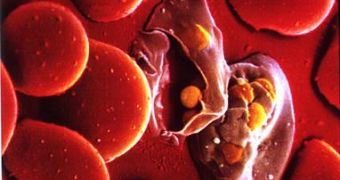This parasite kills 1 to 3 million people annually, 90 % African children in south Sahara, while 650 million suffer the consequences of this disastrous disease. Malaria is caused by a protozoa (single-celled) parasite, Plasmodium, and is transmitted from individual to individual through the bite of the Anopheles mosquitoes, being widespread at the tropics (southern and southeastern Asia, Africa, and central and south America).
With all the modern science, there is no vaccine found against this diseases and the main method of stopping the disease remains destroying its vector, the Anopheles mosquitoes.
Now a Kenyan team has praised a humble fish as one of the latest weapons in the battle against the malaria spreading mosquito.
Nile tilapia (Oreochromis niloticus) is more likely to be seen as a dish by Kenyans, but the research team introduced the species to several abandoned fishponds in the west part of the country. By preying on the mosquito larvae, in 15 weeks the fish dropped the malaria carrying mosquitoes' populations (Anopheles gambiae and Anopheles funestus) by over 94%. Other non-malaria transmitter mosquitoe species was decimated by 75 %.
This finding could be extremely useful as mosquitoes are becoming increasingly resistant to pesticides. "Nile tilapia's taste for mosquitoes has been known since 1917 but this is the first time field data has been published detailing their use in mosquito control," said the team from the International Center of Insect Physiology and Ecology in Nairobi, Kenya.
This way, the fish could have a double advantage: food source and Anopheles mosquito slayer. Others are not so enthused by the new discovery. "This method may well work in a defined area of water, but mosquitoes spread in all sorts of places - including small pools in the mud and puddles - where you obviously can't introduce fish. It just wouldn't work for many areas. We recommend a spectrum of methods to combat malaria, and this could certainly be a useful tool.", said Joanne Greenfield, malaria advisor for the World Health Organization in Kenya.

 14 DAY TRIAL //
14 DAY TRIAL //